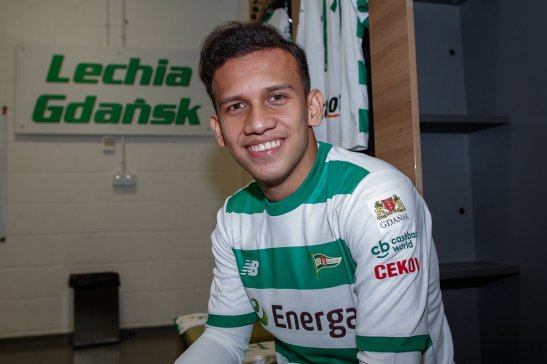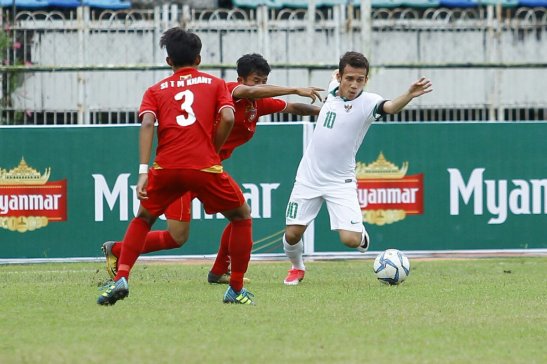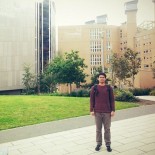Egy Maulana Vikri, How He Gets Signed by Poland’s Lechia Gdansk

Egy Maulana Vikri wears jersey of his new club Lechia Gdansk. (Photo courtesy of Lechia Gdansk)
Jakarta. Indonesia’s 17-year-old football prodigy Egy Maulana Vikri has been signed by Polish top-tier football club Lechia Gdansk as the first footballer from Southeast Asia ever hired by the club. Amid his recent hype both in Poland and Indonesia, Jakarta Globe tries to find information from inner circle of the player, ranging from coaches to an official at the Sports Ministry.
Egy signed a three-year contract with Lechia on Sunday (11/03) in Poland, where at the press conference he posed with number 10 jersey, an iconic number usually possessed by the star of a football team.
According to reports, Egy is promised to be given more chance to play in the Lechia’s first team, a reason why he’s chosen the club.
“I had a lot of inquiries and offers from Asian and European clubs, including Benfica, Italian clubs and a French club Saint-Etienne. For seven days I was at Etienne, they wanted me to play there, but something was missing. I did not feel at home there, they talked to me in the locker room, and I did not understand anything. I will get along in English, but not in French. Maybe this barrier meant that I was not convinced if this was a good place for me. That’s why I told my manager that we should consider other offers,” Egy told Polish media Super Express days after joining Lechia.
“I have great ambitions, but I’m also very young. I want to go to a bigger club someday, but not from its academy track, instead I want to be transferred from team to team, and it could start from Lechia,” he added.
Before signing for the Polish club, Egy first began attracting public attention in July 2016, when he represented a grassroots club Asiop Apacinti to win the under-15 Gothia Cup in Sweden with a phenomenal statistic; scoring 28 goals in 10 matches, a record which made him won the tournament’s most valuable player award.
Afterwards, Indonesians have gradually noticed his talent.
Five months after his actions in Sweden, Egy helped another local club Persab Brebes to win an under-16 Soeratin national championship held by the Indonesian Football Association (PSSI) which involved hundreds of teams from the country’s 34 provinces staged in a tiered series. Egy was eventually named both as the most valuable player and the top scorer of the tournament with 22 goals.
In June 2017, Egy was called by Indra Sjafri, the Indonesia’s under-19 national team coach at the time, to play at Toulon Tournament, a friendly yet prestigious tournament which traditionally invites strong national under-21 teams such as Brazil, Portugal, England and the host itself France.
“I’m intentionally participating in Toulon with this U19 team to play against the older age group, so that my players can level up their abilities,” Indra said at the time.
Indonesia failed to get any point in the Toulon’s group stage and had to go back home early, but one of its players shined. It’s Egy, after just playing in three matches, who received the prestigious Jouer Revelation Trophy, an award which in the past ever attached to football superstars such as Cristiano Ronaldo and Zinedine Zidane.
Furthermore in September 2017, Egy caught attention again when he helped Indonesia to win third in the Asean Football Federation U18 Championship, where he eventually won the player of the tournament and the top scorer awards after scoring eight goals, including two he clinched when Indonesia outclassed the host Myanmar by 7-1 in the third-place match.

Egy in action against Myanmar in the 2017 AFF U18 Championship. (Photo courtesy of PSSI)
During those matches in Myanmar, which were broadcast by a local television, Egy was frequently called as “Egy Messi” by the Indonesian commentators, referring to his ability that is compared to Lionel Messi, the four-time world’s best footballer award winner.
His popularity has been booming since then and when speaking about the best young footballer in the 260-million-populated country, Egy is always on the top of mind.
That opinion was then supported, again, this time by English prominent newspaper The Guardian, who shortly after the Myanmar’s event, named Egy as one of the 60 best young talents in world football.
“I prefer him to play abroad [than for a local club]. He will be an inspiration for other young footballers,” Indra told Jakarta Globe in October last year amid the wonderkid’s trending topic regarding his future career.
Gifted and Talented
It turns out that Egy, a left-footed footballer which naturally played as attacking midfielder, had never been nurtured at any Indonesian professional clubs, a contrary to a more mature industry like in Europe, where super-talented young footballer must be kept by a professional club since early age.
Until his first call-up to the youth national team in 2017, Egy had only represented small, amateur and youth-oriented development clubs like Tasbi Football School, Asiop Apacinti, Persab Brebes and Annisa Pratama Football School.
If it was not because of Subagja Suihan, Egy would haven’t secured contract with Lechia as of today.
Subagja, an ordinary employee who works for state-owned contractor Adhi Karya, first spotted Egy’s talent when the kid trained with Tasbi sometime in 2011 in Medan, capital city of North Sumatra, the place where Egy was born and the football school is based.
Three years later, after meeting with Egy’s parents, Subagja, then called as Egy’s stepfather, was allowed to brought him to Jakarta to do a trial at Ragunan Elite Sports School, a school fully funded by state budget which only admits future top athletes.

A book with Egy picture on the cover. The book is a report from a Sports Ministry’s department which controls the Ragunan School administration. (Photo courtesy of Amal Ganesha)
Bambang Warsito, the football head coach of the school, was immediately impressed by the kid’s natural talent when Subagja introduced Egy for the first time.
“Egy is different, his talent is different. His skills are gifted,” Bambang said in an exclusive interview with Jakarta Globe on Wednesday (14/03).
Bambang, 53, holder of B-level Coaching License from the Asian Football Confederation, is heading the other two football coaches at the school to develop 24 elite young footballers who come from the nation’s varied regions.
“Actually he was a bit late in coming to our annual admission at the time [in 2014], but because his talent was exceptional, we still admitted him to the school,” he said adding that Egy firstly began training at Ragunan as a third-grade of junior high school.
Beside excelling talent, according to Bambang, Egy is also a diligent, discipline and humble person as he always listens advice from the coaches.
“There was a moment in a game where I saw Egy could not control his emotion. I then came close to him after the game, and tell him ‘Egy, if you want to be a successful one, you have to control yourself, control your anger’, and he has listened to my words since then,” Bambang said.
After that moment, Egy had developed his talent in the right track, to be trained by the right coaches for 3.5 years at Ragunan before he signed for Lechia.
Indonesia’s Public-Funded La Masia
“Gold will still be gold even if it’s put in a sewer,” said Bambang, referring to an Indonesian idiom that is used to motivate his young players.
“I’m so proud of him [Egy], for sure the coaches are proud. I’m agree [with opinions] that he can be the best footballer Indonesia has ever had, just like Messi,” he added.
The “Egy Messi’, which is now often attached to the player, was not a coincidence.
“I remember during his early years at Ragunan, I talked to my assistants that this kid, with his left-footed, is seemed like Messi, we could have a Messi,” Bambang said.
“With his strong left foot, I often put him in the right and the left flanks to make opponents confused. But my preference about his best position is always in the second striker post,” he said.
With that position, Bambang benefited from Egy’s service with a triumph in the 2016 U16 Soeratin Cup representing Persab Brebes, an amateur club who contracted Bambang and co. to be a caretaker of the club occasionally for the tournament.
In Indonesia, where football industry has been developing, Ragunan athletes often represent varied clubs, even in the National Sports Week, with undisclosed fees paid by sponsors, or owner of the teams.
So, it is common to see young footballers play with different strips in a relatively short period, such as Egy who could represent many clubs to play at different tournaments in 2016.
“At Ragunan, each athlete is given Rp 1 million ($70) monthly allowance. They are free from paying any cost including meals and dorm,” said Bambang, who was once a professional footballer of Persija Jakarta in 1990s.
The school, established in 1976, now educates 210 young elite athletes aged 12 to 17 years old who take sport training 3.5 hours per day in average, apart from from studying academic subjects, just like usual students.
The school, however, has a specialized academic curriculum which is tailored for athletes.
Every year it selects new athletes from 16 sport disciplines to be admitted.
“As for football, we only admit eight new players annually. They can also be expelled from the school if they are not performing well as an athlete,” Bambang said.
The public school has been the best football academy in the country as many Indonesian professional football clubs don’t have sustained academy program and facilities instead. Its concept is rather similar to La Masia, the well-known football academy owned by FC Barcelona, place where it has groomed the world star Messi.
The real difference is that the Ragunan provides education for other sports, not just football like that of La Masia.
Ragunan, moreover, has produced plenty of the country’s top footballers who ever represent the national team, such as goalkeeper Andritany Ardhiyasa, right-back Putu Gede Juni Antara, midfielder Muhammad Hargianto, Ian Louis Kabes, defender Abduh Lestaluhu and Malaysia’s Selangor’s forward Ilham Udin Armaiyn.
“With Rp 20 billion [$1.4 million] annual budget, the Ragunan School educates future top athletes for everything, like clothes, meals, facilities and allowances,” said Teguh Raharjo, the Sports Ministry’s Assistant Deputy Minister for Sports Center and School Development, who spoke with Jakarta Globe at his office in Jakarta on Wednesday.

Teguh Raharjo, the Sports Ministry official who administer the Ragunan School, frequently says that public must be aware that Egy Maulana Vikri has been mostly developed under state budget sponsor. (Photo courtesy of Amal Ganesha)
According to Teguh, the school is the best center for elite young athletes in Indonesia, but the current budget is not ideal enough.
“The school is actually abandoned. Especially the facilities, which are not proper. But, despite that limitation, the school has still produced the country’s best athletes,” he said.
The kind of school, is also provided in another region, but with a bit difference.
“We have another concept similar to Ragunan School, it is called the PPLP [abbreviation for Students’ Sports’ Learning and Training Center] which is spread in 34 provinces. The difference is just the PPLP students go to schools we partner with, while Ragunan students all stay at the same school,” Teguh said.
The halted Sports Ministry’s Hambalang Project, was intended to be the new Ragunan School, according to Teguh. But it was unfortunately suspended due to a graft charge accused to former Sports Minister Andi Mallarangeng from the Democratic Party.
This Time, Would It be Real?
Previously, Indonesia ever had its footballers signed by professional clubs in Europe but none of them were achieved with significant process as that of Egy.
Indonesian striker Kurniawan Dwi Yulianto and goalie Kurnia Sandy were selected into an elite under-19 team formed by the football association PSSI in 1993 to train and live with Sampdoria’s youth team in Italy. According to sport tabloid BOLA, the project, often called as ‘the Primavera’ was initially backed by Indonesian businessmen who contributed around Rp 12 billion ($840,000) at the time to sponsor 20 players to stay at the Italian club for three years.
Kurniawan joined FC Luzern of Switzerland in the 1994/95 season, playing 10 times as a loanee from Sampdoria and recorded a historic milestone; he was the first Indonesian to score a goal in the senior’s competitive game in Europe. Kurniawan contributed Luzern’s 2-1 win over FC Basel in a league game in 1995 with a goal coming from his header.
In the next year, Kurniawan came back to train with Sampdoria’s youth team and never get any chance to play with the seniors.
The Primavera project ended in 1996 with no significant output ever sustained. Kurniawan came back home to Indonesia in that year along with his colleague Bima Sakti who previously joined Sweden’s Helsinborg IF in 1995/96 season.
In 2008, PSSI launched the same strategy, this time sending a squad comprised of 25 players aged under-19 to play in an Uruguay’s youth league called the Quinta Division. According to newspaper Sinar Harapan cited on Goal.com, the project took around Rp 12.5 billion per season and was ended after unsuccessful results in 2012.
Another Indonesian player Arthur Irawan was signed by Spanish top club Espanyol in 2011, but he had only managed to get 28 appearances in the youth league during his four-year tenure in Spain, according to Wikipedia. From 2014 to 2016, Arthur played for Belgium’s top-tier club Waasland-Beveren, only getting one appearance in a competitive match. In 2017 he came back home and now is playing for East Java’s Persebaya Surabaya.
Reporting and writing by Amal Ganesha for the Jakarta Globe.

Recent Comments